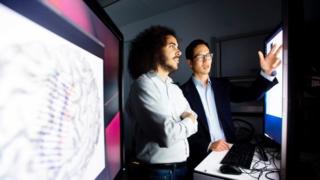 Image copyright
Image copyright
UCSF
Eddie Chang (proper) and David Moses hope the work will assist these with speech loss
Facebook has introduced a breakthrough in its plan to create a tool that enables folks to sort simply by pondering.
It has funded a examine that developed machine-learning algorithms able to turning mind exercise into speech
It labored on epilepsy sufferers who had already had recording electrodes positioned on their brains to asses the origins of their seizures, forward of surgical procedure.
Facebook hopes it can pave the way in which for a “fully non-invasive, wearable device” that may course of 100 phrases per minute.
‘Muscle twitches’
University of California San Francisco scientists requested the sufferers to reply out loud a listing of straightforward multiple-choice questions ordered randomly.
And the algorithms realized to establish:
- the query that they had been requested, 75% of the time
- their chosen reply, 61% of the time
“Most previous approaches have focused on decoding speech alone,” Prof Eddie Chang mentioned, “however right here we present the worth of decoding either side of a dialog – each the questions somebody hears and what they are saying in response.
“This reinforces our instinct that speech will not be one thing that happens in a vacuum and that any try to decode what sufferers with speech impairments try to say can be improved by making an allowance for the total context through which they’re making an attempt to speak.
“Currently, sufferers with speech loss because of paralysis are restricted to spelling phrases out very slowly utilizing residual eye actions or muscle twitches to regulate a pc interface.
“But, in lots of instances, data wanted to supply fluent speech continues to be there of their brains.
“We just need the technology to allow them to express it.”
‘Safe place’
Researcher David Moses mentioned: “It’s important to keep in mind that we achieved this using a very limited vocabulary – but in future studies we hope to increase the flexibility as well as the accuracy of what we can translate from brain activity.”
The examine is revealed in Nature Communications.
Image copyright
UCSF
Electrodes had been quickly positioned on the floor of the mind of epilepsy sufferers
“Ultimately, the researchers hope to reach a real-time decoding speed of 100 words per minute with a 1,000-word vocabulary and word error rate of less than 17%,” Facebook wrote on its weblog.
“And by demonstrating a proof-of-concept utilizing implanted electrodes as a part of their effort to assist sufferers with speech loss, we hope UCSF’s work will inform our growth of the decoding algorithms and technical specs…
https://www.bbc.co.uk/news/technology-49165713
